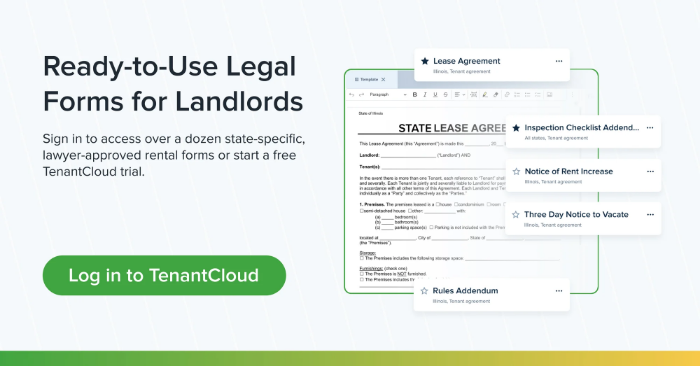At least once a year, landlords encounter a dilemma of raising a tenant's rent. You might be tempted to resist raising the rent if you have a good tenant. However, your profits will suffer if your taxes, insurance, and utility prices increase, but your rental revenue does not.
There are a few factors you need to consider when figuring out how to increase the rent on your property, especially if the tenant may find them objectionable.
We have covered those factors and simplified the rental increase procedure into five steps for landlords faced with this challenge.
Step One. Specify Why You Might Increase the Rent
It's essential to manage your expenses and make sure you're making money as a landlord. Learning how to increase rent could be an intelligent move for scaling up your business. If you want to increase your rent, consider the following costs:
- Property taxes
- Higher utility costs
- HOA
- Premium insurance
- Cost-of-living expenses
- Maintenance
Add these expenses to the rent amount, so you have enough money to pay for them when your vacancy is empty or leases are renewed. Keep in mind that you are a business in the first place. Regardless of how close or friendly you are with your tenants, it's time to revise the rent if you are losing money to keep it operating.
Median Monthly Rent Nationwide Since 2015
Selected Years | Monthly Rent | Average Annual Change |
|---|---|---|
| 2024 | $1,806 (AR) | +5% |
2023 | $1,180 (FMR*) | +8.96% |
2022 | $1,083 (FMR) | -9.07% |
2021 | $1,191 | +8.67% |
2020 | $1,096 | +3.20% |
2019 | $1,062 | +3.81% |
2018 | $1,023 | +4.18% |
2017 | $982 | +3.44% |
2016 | $949 | +2.26% |
2015 | $928 | +0.87% |
*Fair Market Rent (FMR). The FMR is not the price the average renter pays.
Step Two. Check Your Local Laws and Regulations
Depending on the local law, a landlord could increase the rent before renewing the lease. A lease agreement establishes a fixed rent payment for a specific length of time (such as six months or a year). Even if the property changes ownership during that time, the rent price won't change.
Depending on state and municipal laws, a rent increase for renters in the Housing Choice Voucher Program, or Section 8, is commonly permitted once a year. Rent increases can be justified using the new Fair Market Rent guidelines that the HUD establishes yearly.
Do not discuss rent increases with renters or seek their input. Do your homework and choose a fair, reasonable amount to raise the price of your rental to market levels. Knowing your local market is essential because tenants might leave if the rent increase is significantly higher than the market rate.
There are some critical circumstances in which a landlord cannot increase the rent. For instance, raising the rent might not be possible if:
- A landlord wants to increase the rent before lease renewal.
- The lease restricts a rent increase.
- There needed to be a proper notice of the rent increase.
- Rent on the property is regulated.
- The increase may be intended to punish or evict a tenant.
- The Fair Housing Act states that the increase discriminates against a tenant.
Step Three. Check Lease Agreement Details
Once you've figured out the fair market rent, it's time to review the existing lease agreement. A lease should provide specific rules and conditions regarding rent increases:
- Clearly stating how often rent can increase.
- A rent increase notice is required before increasing the rent.
- Limits on how much the rent can go up.
Unless scheduled rental increases are built into the lease, a 1-year rental agreement generally allows for one rent increase per year at the time of renewal. If landlords or property managers use a two or 3-year lease to keep tenants around, they can only increase the rent when the lease ends.
When renewing the lease, remember to use online leases and e-signatures to benefit both parties by saving time, improving security, and offering the convenience of 24/7 hassle-free access to documents.
National Rent Price Trends
(source Rent Research)
Step Four. Deliver Rent Increase Letter to Tenants
To determine how much notice you must provide, consult your lease agreement and state laws when preparing a landlord rent increase letter to tenants. The minimum required is typically 30 days' notice in most states.
If the lease is renewed, send a 90-day notice to your tenant about the rental increase before the lease expires. This notice will allow them to adjust their spending and be prepared for changes.
Sending the renewal information 90 days beforehand encourages tenants to take advantage of incentives.
You can use incentives to offer discounts to your tenants for renewing early. For example, if your tenant renews their lease 60 days before the expiration date, you may offer them a 3% increase instead of the 5% increase that would take effect if they signed a renewal 30 days before the end of the lease.
Offering early renewal incentives will encourage tenants to renew their lease earlier, be less inclined to complain about the increase, and give them the option to save money. Even if they don't plan to stay, a 90-day notice increases the probability that the tenant will inform you if they are moving out, so you may start advertising sooner.
It's generally a win-win for everyone involved.
To reduce lost rental income due to tenant turnover, consider using a rental listing website to promote your rental if your tenant intends to move out.
Step Five. Upgrade the Rental and Keep Up With Maintenance Requirements
By replacing some outdated appliances or making other improvements to the property that your present tenants have requested, you can further incentivize them to stay despite rental increases.
On the other hand, if you disregarded requests from your renters for repairs and maintenance, you have little possibility of successfully increasing the rental rate.
Any capital improvements to the rental property should be considered when planning renewals and any potential increases that may accompany them.
Conclusion
Of course, some renters may still call and express their displeasure with the rise in the rental cost, or they may even opt to relocate, but most likely, they will accept it as one of the drawbacks of renting.
Raising rent is a challenging but essential step for landlords to scale up and grow their businesses. Do you have some advice that helped you to increase your rent without pushing your tenants away? Share your expert experience and thoughts with us!
Sources:
- Cost of rent by state and county in the United States - https://en.wikipedia.org/wiki/Cost_of_rent_by_state_and_county_in_the_United_States
- Average Rent by State - https://wisevoter.com/state-rankings/average-rent-by-state/
- Housing Choice Vouchers Fact Sheet - https://www.hud.gov/topics/housing_choice_voucher_program_section_8
- Fair Market Rents (40th PERCENTILE RENTS) - https://www.huduser.gov/portal/datasets/fmr.html
- The Rent Report September 2023 - https://www.rent.com/research/average-rent-price-report/
- Guide to Rental Market Trends Payments, Listings, and Single-Family Rentals (Q4 2020- Q2 2024) - https://www.tenantcloud.com/the-comprehensive-guide-to-rental-market-trends







